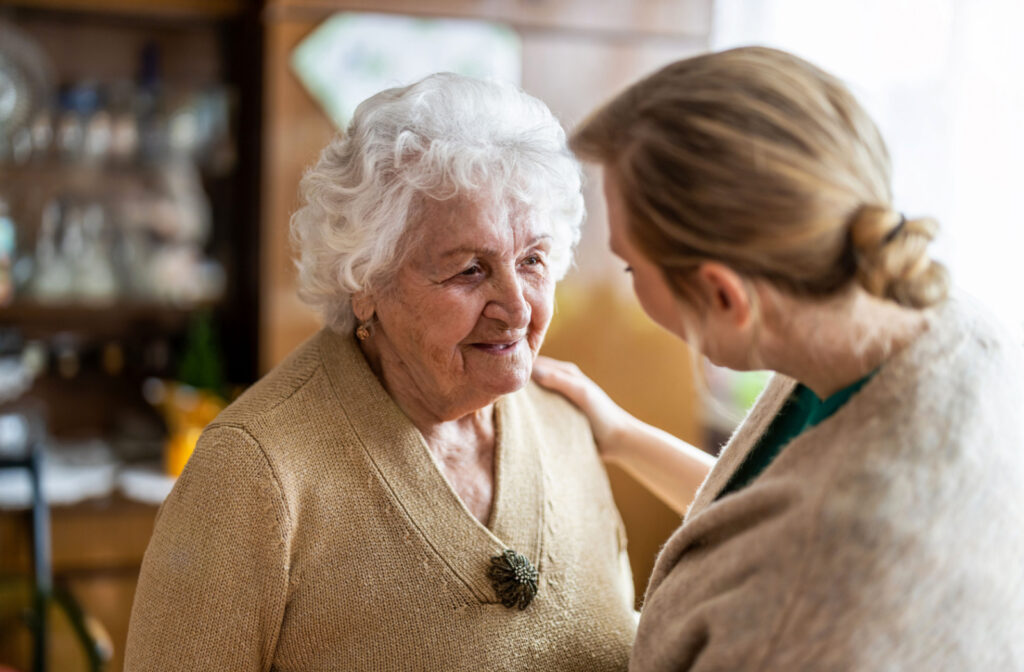As we age, our body undergoes various changes that can affect our mental and physical health. One of the common issues that older adults may face is hallucinations or seeing things that are not there.
Hallucinations can be a frightening and confusing experience for older adults, and it can be difficult to understand the underlying causes. If you know an older adult who is experiencing hallucinations, it is essential to understand the potential causes and seek appropriate treatment.
Some common causes of hallucinations in older adults can stem from conditions such as Parkinson’s disease and dementia, mental health conditions such as depression, medications, sleep deprivation or sleep disorders, sensory deprivation, or dehydration and malnutrition.
It is important to look after our overall health, especially as we age, and Barton House Memory Care is here to help support you with specialized care and a professional community.
Medical Conditions
Several medical conditions can cause hallucinations in older adults.
Parkinson’s disease, for example, is a neurodegenerative disorder that affects the nervous system and can lead to hallucinations. Similarly, dementia and delirium can cause changes in the brain that result in hallucinations.
These conditions can affect how the brain processes and interprets sensory information, leading to perceptual distortions or misinterpretations.
It’s really important that if an older adult has any of these conditions, they work with a medical professional. This way, they can manage the underlying condition and address the hallucinations.
Remember, it’s always best to consult with a healthcare professional who can provide guidance based on an individual’s specific circumstances.
Mental Health Conditions
Depression and anxiety are common among older adults, and they can sometimes be linked to hallucinations. Some people who experience severe depression may also have hallucinations and delusional thinking.
It’s a complex situation where emotional distress and psychological factors can influence how someone perceives their surroundings, which might heighten the risk of hallucinatory experiences.
What’s important to remember is that we need to provide emotional support to our older adults. Helping them address and overcome any issues causing hallucinations can make a huge difference in their quality of life.
If we notice any signs of depression or anxiety in our elderly loved ones, it’s crucial to consult with a healthcare professional who can provide appropriate guidance.
Medications & Polypharmacy
Certain medications can lead to hallucinations in older adults. This is particularly true for drugs that affect the central nervous system, like narcotics, sedatives, and anti-anxiety medications.
Polypharmacy, the practice of taking multiple medications at the same time, can also increase the risk of hallucinations. This makes it all the more important for healthcare professionals to regularly review and adjust their patients’ medications to minimize potential adverse effects.
In some cases, even antibiotics like cephalosporins and sulfa drugs have been associated with hallucinations, although this effect is more common in patients who are already at an advanced age.
And let’s not forget about morphine. It seems that older patients who take this drug might experience hallucinations more commonly.
So, if you know an older adult taking any of these medications, it would be a good idea to chat with their healthcare provider. They could provide information on potential alternatives and help you understand the risks and benefits.
Sleep Deprivation & Sleep Disorders
Inadequate sleep or untreated sleep disorders can have a significant impact on mental health in older adults. It’s been found that hallucinations can arise as a result of sleep deprivation, which disrupts the normal functioning of the brain.
Conditions like sleep apnea, insomnia, or restless leg syndrome are common in older adults and should be addressed promptly to improve sleep quality. If left untreated, these sleep disorders can contribute to poor mental health.
So, it’s essential that older adults get enough quality sleep and seek medical help for any sleep disorders they might be experiencing.
Sensory Deprivation
When someone experiences sensory deprivation, it can indeed lead to hallucinations. When our brain is deprived of sensation, it tries to restore sensation through hallucinations.
Engaging older adults in activities stimulating their senses, like listening to music, is a great way to help reduce hallucinations. It’s also important to note that older adults with impaired vision or hearing may experience hallucinations as their brain attempts to compensate for these sensory deficits.
When there’s a lack of accurate sensory input, the brain can create false perceptions, which can contribute to hallucinatory episodes. So, our elderly loved ones must be receiving accurate and enough sensory input.
Dehydration & Malnutrition
Dehydration and malnutrition are common issues in older adults, and they can both seriously impact cognitive function. In severe cases, these conditions may even contribute to hallucinations.
Proper hydration and balanced nutrition are essential for maintaining overall health and reducing the risk of cognitive disturbances. So, we must keep an eye on our loved ones to make sure they’re getting enough fluids and nutrients.

Navigating the Complex Landscape of Senior Hallucinations
Hallucinations can be a challenging and frightening experience for anyone, older adults in particular.
Understanding the potential causes and addressing them in time can help reduce the incidence of hallucinations and improve quality of life. If you suspect an older adult is experiencing hallucinations, don’t hesitate to reach out to a trained professional with Barton House Memory Care. We are here to help! With proper care, older adults can live happy and healthy lives. Book a tour with us today, and bring your questions!



